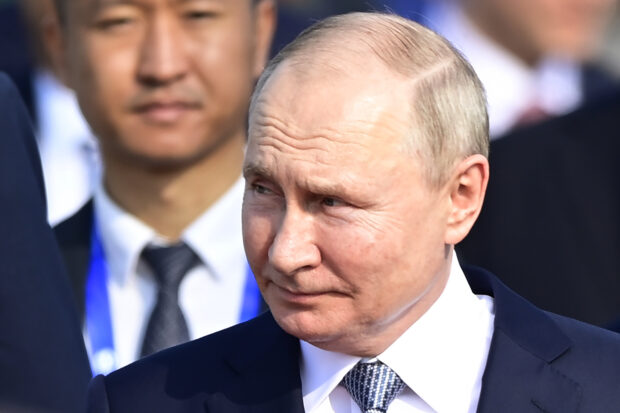Key leaders joining Belt and Road forum and their wish lists to Beijing

Russia’s President Vladimir Putin arrives at Beijing Capital International Airport to attend the third Belt and Road Forum in Beijing, Tuesday, Oct. 17, 2023. Putin landed in Beijing on Tuesday, on his first trip outside the former Soviet Union since the International Criminal Court issued a warrant for him in March over his alleged involvement in the mass abduction of children from Ukraine (Parker Song/Pool Photo via AP, File)
BEIJING — China is hosting its third international forum centered around President Xi Jinping’s signature policy, the Belt and Road Initiative, which over the past 10 years has built infrastructure across continents, burdening some smaller countries with debt.
The forum brings a flurry of diplomacy to Beijing, including at least 20 heads of state and government, mostly hailing from developing markets in Southeast and South Asia, the Middle East, Africa and Latin America.
Here are some key leaders visiting Beijing and an overview of their countries’ involvement in the Belt and Road projects.
Russian President Vladimir Putin
Russian President Vladimir Putin landed in Beijing on Tuesday, on his first trip outside the former Soviet Union since the International Criminal Court issued a warrant for him in March over his alleged involvement in the mass abduction of children from Ukraine.
Putin’s visit underscores China’s economic and diplomatic support for Moscow amid the isolation brought by its war in Ukraine. In an interview with Chinese state media ahead of his visit, Putin described BRI projects – which the U.S. has called a “debt trap” for smaller countries – as China’s “desire for cooperation” in the global arena.
Russia has been aiming to redirect trade toward Asia after being shut out by the European Union over its Ukraine war. China-Russia trade soared 30 percent in the first half of the year and is expected to exceed $200 billion this year, according to the Russian government.
One of Russia’s priorities in terms of joint infrastructure projects with China is building the Power of Siberia-2 pipeline, which is set to traverse Mongolia and enable Moscow to sell more natural gas to China.
Sri Lankan President Ranil Wickremesinghe
Sri Lanka, along with Zambia, is one of the countries that have defaulted on their debt to China and other international lenders. The country’s former president, Gotabaya Rajapaksa, stepped down in July 2022 amid protests over soaring inflation and a severe economic crisis.
Sri Lanka had accessed Chinese financing to build highways, a port, an airport and a coal power plant, raking in $7 billion in debt. As part of its efforts to repay Beijing, Colombo handed it over control of a strategic port, in a move often referenced by BRI critics as an example of China’s “debt trap” diplomacy.
Last week, Sri Lanka reached an agreement with the Import-Export Bank of China to cover about $4.2 billion of that debt as part of a broader restructuring plan involving deals with other international creditors including India and Japan.
Sri Lankan President Ranil Wickremesinghe, who took office last year, is attending the forum as part of his first official trip to China. He is expected to hold a bilateral meeting with Xi.
Kenyan President William Ruto
One of the key BRI projects in Africa is the Mombasa-Nairobi Railway, extending for 592 kilometers (368 miles) and connecting Kenya’s largest port to its capital. Opened in 2017, China touts the project as a success story, saying it has supported Kenya’s economic growth. But work on a second section of the railway, which was meant to reach neighboring Uganda and serve other landlocked countries halted after Kampala pulled out and opted instead for a partnership with a Turkish firm.
Kenya owes about $6 billion to China, according to national data. President William Ruto is expected to explore funding options for the remaining section of the railway during the Belt and Road summit.
Indonesian President Joko Widodo
In Southeast Asia, one of the most prominent BRI projects has been the construction of a high-speed 142-kilometer (88-mile) railway linking Indonesia’s capital, Jakarta, to the economic hub of Bandung. Indonesian President Joko Widodo inaugurated the $7.3-billion China-funded project earlier this month.
He is expected to meet Xi and discuss a plan to extend the railway by about 700 kilometers (435 miles) to the city of Surabaya, as well as new potential investments in renewable energy projects and trade.
Hungarian Prime Minister Viktor Orban
Hungarian Prime Minister Viktor Orban is the only EU head of state or government to attend the Belt and Road forum.
Hungarian media reports last month suggested a Chinese-backed railway project connecting Budapest with Belgrade has hit snags and China would halt funding. Chinese Foreign Minister Wang Yi earlier this month told his Hungarian counterpart the project would continue as planned.
Orban’s participation as the sole EU leader at the event comes in contrast with the 2019 edition of the forum when then-Italian Prime Minister Paolo Gentiloni attended right as Italy had formally joined the initiative.
Italy this year signaled its intention to drop out of the scheme as major China-backed infrastructure projects haven’t materialized, while Italy’s trade deficit with China has more than doubled, to 48 billion euros (around $50 billion), since 2019.
Argentina President Alberto Fernandez
Argentina’s President Alberto Fernandez also arrived in Beijing on Tuesday. Argentina is one of the countries that joined the BRI relatively recently, in 2022, seeking Chinese investment in areas such as railways, nuclear energy, solar and hydropower, agriculture and digital infrastructure. Argentina has asked China to fully finance a new $8.3-billion nuclear power plant.
China’s focus in Latin America lies in green technology and the extraction of minerals, according to experts. Chinese companies are involved in dozens of lithium extraction projects in Argentina and Chile, according to research by Facultad Latinoamericana de Ciencias Sociales in Buenos Aires